Budgies, also known as parakeets, are popular pet birds cherished for their vibrant colours, playful nature, and ability to mimic human speech.
These small, friendly birds can bring immense joy to their owners. However, budgies can experience stress like any living creature, impacting their overall well-being and behaviour.
Understanding and addressing stressed budgie behaviour is essential for their health and happiness. This article aims to shed light on the signs of stress in budgies, its causes, and practical strategies to alleviate their anxiety.
By delving into this topic, bird enthusiasts and pet owners can gain valuable insights into creating a nurturing and stress-free environment for their beloved budgies.
Understanding stressed budgie behaviour is crucial in providing optimal care for these delightful feathered companions, whether you are a first-time budgie owner or a seasoned bird enthusiast.
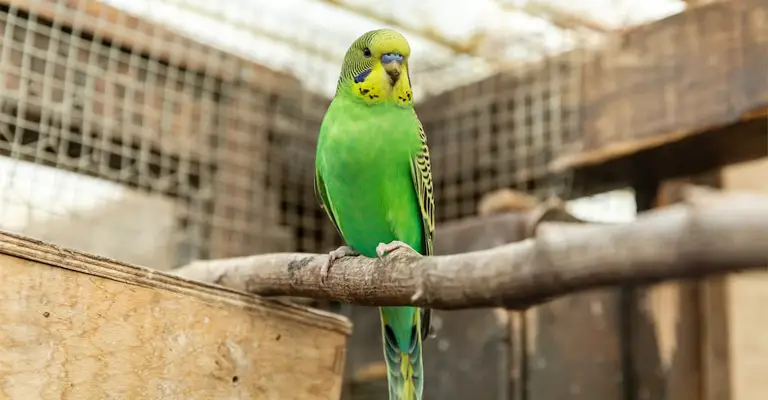
Understanding Budgie Behavior
Budgies, also known as parakeets, have specific behaviours indicative of their well-being and emotional state. Recognizing normal budgie behaviour is essential for identifying signs of stress.
Additionally, understanding the common anxiety symptoms in budgies can help caretakers take appropriate action to address their needs.
Normal Behaviour Of Budgies
Budgies are active and social birds that enjoy interacting with their environment and companions. They engage in behaviours such as chirping, playing with toys, exploring their surroundings, and grooming themselves or other budgies. They are curious and intelligent creatures that thrive on mental stimulation and social interaction.
Common Signs Of Stress In Budgies
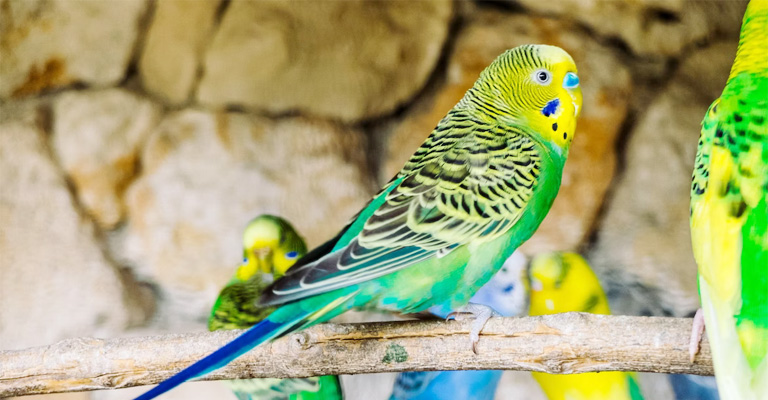
- Feather plucking and excessive preening: Stress can manifest in budgies through the compulsive plucking of their feathers or excessive preening. This behaviour can result in bald patches or damaged feathers.
- Aggressive or fearful behaviour: Stressed budgies may exhibit aggression towards humans or other birds, biting or lunging. They may also become more nervous or skittish, seeking to hide or retreat.
- Loss of appetite or changes in eating habits: Stress can cause a loss of appetite or changes in eating habits, such as reduced food intake or selective feeding.
- Vocalizations and excessive screaming: Stressed budgies may vocalize more frequently, emitting loud and persistent squawks, screams, or chirping. This is their way of expressing distress.
- Changes in physical appearance: Stressed budgies may exhibit material changes like fluffed-up feathers, hunched posture, or a drooping head. They may also show signs of lethargy or decreased energy.
- Decreased activity and lack of interest in toys or interaction: Stressed Budgies may become less active and lack interest in toys or social interaction. They may spend more time sitting quietly in one place.
Understanding these signs of stress in budgies is crucial for addressing their needs and creating a conducive environment that promotes their well-being.
Causes Of Stress In Budgies
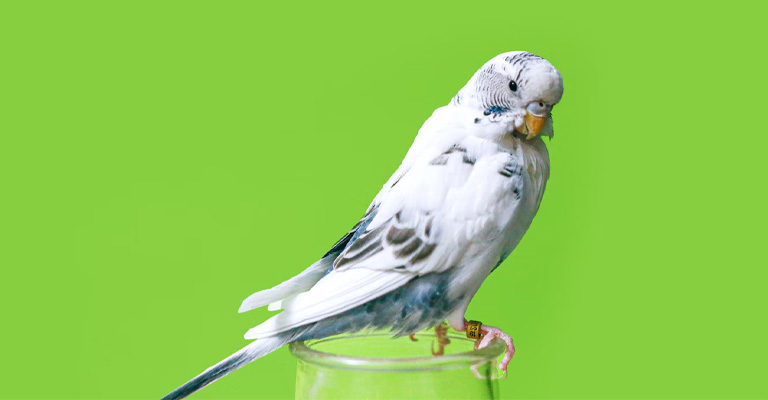
Stress in budgies can arise from various environmental factors, social interactions, and overall health. Identifying these potential stressors is crucial in addressing and alleviating the bird’s distress, promoting a happier and healthier avian companion.
Environmental Factors
- Inadequate cage setup: A cramped or improperly designed cage can lead to stress in budgies. They require enough space to move around, stretch their wings, and engage in natural behaviours like hopping and climbing. Lack of perches, toys, and hiding spots can also contribute to their anxiety.
- Lack of mental stimulation: Budgies are intelligent and curious creatures, and without mental stimulation, they can become bored and stressed. A monotonous environment without interactive toys or opportunities for mental challenges may result in behavioural issues.
- Exposure to loud noises or sudden changes: Budgies are sensitive to loud noises and sudden changes in their surroundings. Household noises like vacuum cleaners or loud music can startle and stress them.
- Similarly, frequent changes in their living environment can disrupt their sense of security and lead to anxiety.
- Poor lighting and temperature conditions: Inadequate lighting and extreme temperature fluctuations can negatively impact budgies’ well-being. Insufficient exposure to natural light may disrupt their sleep patterns.
At the same time, drastic temperature changes can make them uncomfortable and vulnerable to health issues.
Social Factors
- Loneliness and lack of companionship: Budgies are social birds that thrive in the company of their kind. A solitary budgie may become lonely and anxious, leading to stress. It is essential to consider getting a companion bird or spending sufficient time interacting with your budgie.
- Conflict with other birds or pets: If multiple birds or pets share the same space, disputes or harassment can occur, causing stress to the budgie. Observing their interactions carefully and intervening if necessary to ensure a harmonious living environment is crucial.
Health-Related Factors
- Illness or pain: Physical discomfort due to illness or pain can significantly stress a budgie. Common health issues like respiratory infections or feather mites can negatively impact their well-being and behaviour.
- Poor diet and nutrition: Inadequate nutrition can lead to deficiencies and weaken a budgie’s immune system, making them more susceptible to stress and illness.
- Hormonal changes: Hormonal fluctuations, especially during breeding seasons, can affect budgies’ behaviour, leading to increased irritability and stress.
Addressing Stressed Budgie Behavior
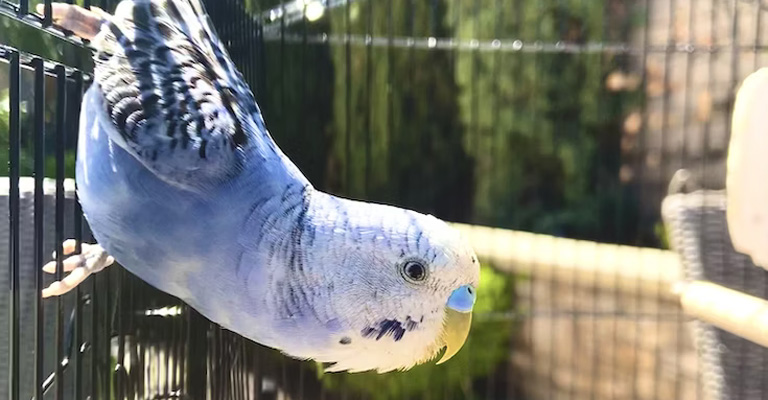
When budgie exhibits signs of stress, their well-being must address these issues promptly and effectively. Several critical approaches can be employed to create a healthy and stress-free environment for your feathered friend.
Creating A Suitable Environment
Ensuring a proper living environment is essential for reducing budgie stress. Choose an appropriately sized cage with horizontal bars to allow climbing and provide crucial accessories such as perches, swings, and toys for mental stimulation.
Maintain a comfortable temperature (between 65-80°F) and offer proper lighting with a regular day-night cycle to mimic their natural habitat.
Socializing And Companionship
Budgies are highly social creatures and benefit significantly from human interaction. Spend quality time with your budgie daily, engaging in gentle talking and handling to foster a strong bond.
If you notice signs of loneliness, consider introducing a compatible companion bird or even a small flock of budgies for added socialization.
Addressing Health Concerns
Regular veterinary check-ups are crucial for the early detection of potential health issues. Ensure your budgie receives a balanced diet with seeds, fresh vegetables, and occasional fruits to support their health.
Be vigilant about changes in behaviour, as they may signal underlying health problems, and seek appropriate veterinary care when necessary. You can significantly reduce stress in your budgie’s life by addressing health concerns proactively.
Behavioural Modification Techniques
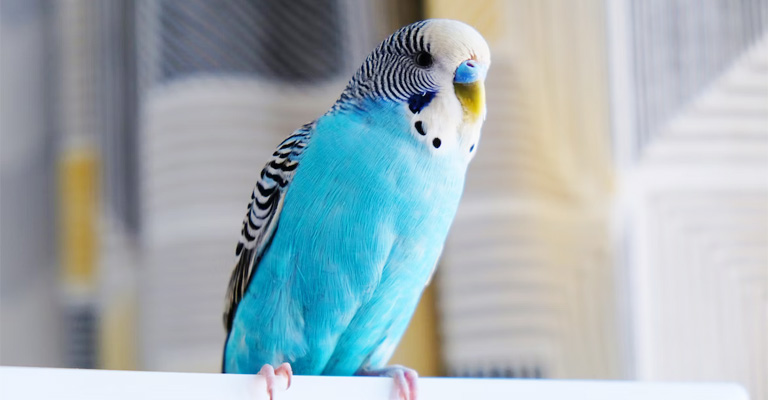
Employing effective behavioural modification techniques is crucial to help stressed budgies overcome their anxiety and improve their overall well-being.
These methods focus on positive reinforcement, desensitization, and environmental enrichment to create a comfortable and supportive atmosphere for the birds.
Positive Reinforcement Training:
Positive reinforcement involves rewarding desired behaviours in budgies to encourage them to repeat those actions. Offering treats and rewards for good behaviour can be highly effective in reinforcing positive habits. Target and clicker training also helps establish clear communication and build a strong bond between the bird and its owner.
Desensitization And Counterconditioning:
Desensitization entails gradually introducing budgies to their stressors in a controlled manner. This process makes them more accustomed to potential triggers, reducing their fear or anxiety.
Pairing positive experiences with previously stressful situations can help the birds associate these circumstances with pleasant outcomes, eventually mitigating their stress response.
Environmental Enrichment:
A stimulating and enriching environment for budgies is vital for their mental and emotional well-being. Interactive toys and puzzles engage their curiosity and intelligence, keeping them mentally active and entertained.
Offering foraging opportunities, where they search for food in their surroundings, mimics their natural behaviour in the wild and promotes mental stimulation.
Seeking Professional Help
Recognizing the complexities of budgie behaviour and addressing stress-related issues, seeking professional help becomes paramount. Consulting an avian veterinarian is crucial when budgies exhibit persistent signs of stress or any concerning health problems.
A qualified avian veterinarian can conduct thorough examinations, offer accurate diagnoses, and recommend appropriate treatments or interventions to improve the budgie’s well-being.
When To Consult An Avian Veterinarian:
Avian veterinarians specialize in bird health and are equipped to handle various avian species, including budgies. It is advisable to seek their expertise if the budgie displays ongoing signs of stress, such as excessive feather plucking, loss of appetite, or unusual lethargy.
Additionally, any sudden changes in behaviour or physical appearance should prompt a visit to the avian veterinarian to rule out potential health issues.
Finding An Avian Behaviorist Or Trainer:
In cases where budgie stress is linked to behavioural problems, consulting an avian behaviourist or trainer can be beneficial. These professionals possess a deep understanding of bird behaviour and can help identify the root causes of stress.
They can design customized behaviour modification plans, incorporating positive reinforcement techniques and environmental adjustments to address specific issues and enhance the budgie’s emotional well-being. Look for reputable avian behaviourists or trainers with experience working with budgies for the best results.
Frequently Asked Questions
Yes, budgies can experience separation anxiety when left alone for extended periods. Providing companionship, engaging toys, and a predictable routine can help alleviate separation anxiety.
Introduce budgies gradually by placing their cages near each other. Allow them to observe and interact through the cage bars before attempting supervised face-to-face introductions.
To minimize stress during transportation or travel, ensure the budgie’s cage is secure, provide familiar toys or objects from their regular environment, and cover the cage partially to create a sense of security.
Health-related stress in budgies can manifest as changes in eating or drinking habits, lethargy, abnormal droppings, difficulty breathing, or visible signs of discomfort, such as excessive scratching or feather plucking.
Soft, soothing music or background noise can provide a calming effect on budgies. However, avoid sudden loud noises or prolonged exposure to loud music, which can cause additional stress.
Conclusion
Stress can have a significant impact on a budgie’s overall well-being. Understanding the causes and signs of stress in budgies and implementing strategies to address it effectively can create a safe and nurturing environment for your feathered companion.
Remember to provide socialization, a balanced diet, mental stimulation, and veterinary care to promote your budgie’s healthy and stress-free life. You can help your budgie thrive and enjoy a happy and fulfilling life with patience and maintenance.